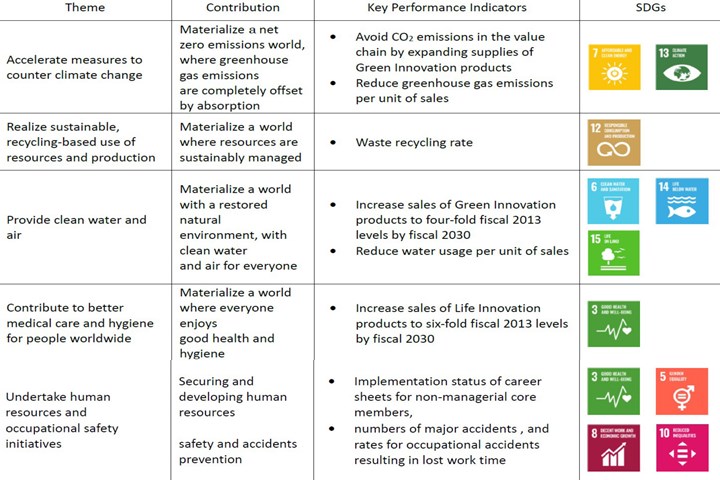Toray finalizes funding for sustainability initiatives
According to Toray Industries, the finance aims to provide ongoing support for corporate activities that contribute to materializing Sustainable Development Goals (SDGs).
Share

Figure 1: Established themes for initiatives that help materialize SDGs. Source | Toray Industries Inc.
Toray Industries, Inc. (Tokyo, Japan) announced on August 27 that it has concluded a Positive Impact Finance agreement with Sumitomo Mitsui Trust Bank, Ltd. (Tokyo, Japan). According to Toray, this finance aims to provide ongoing support for corporate activities that contribute to materializing Sustainable Development Goals (SDGs) in keeping with the Principles for Positive Impact Finance1 of the United Nations Environment Programme Finance Initiative (UNEP FI).
According to Toray, the United Nations Environment Programme was created in 1972 to implement the Declaration of the United Nations Conference on the Human Environment and international environmental action plans. UNEP FI is said to work closely with more than 200 financial institutions that are programme signatories. Since its launch in 1992, this initiative has collaborated with financial institutions, policymakers, and regulators to transform financial systems so they integrate economic progress and environmental, social and governance considerations.
Toray formulated its Toray Group Sustainability Vision in July 2018 to reiterate its ongoing business stance and initiatives over the medium- and long-terms, and says it presents its vision for the world by 2050, as well as its specific objectives. Toray notes that it is constantly tackling challenges to materialize its vision. Sumitomo Mitsui Trust Bank agreed to conclude the new accord in view of Toray’s efforts to contribute to SDGs.
The Japan Credit Rating Agency, Ltd., provided a third-party opinion to ensure the transparency and objectivity of Sumitomo Mitsui Trust Bank’s evaluation.
In concluding this agreement, Toray says it established the following themes (see Figure 1) for initiatives that help materialize SDGs. The company discloses its progress and achievements from such endeavors through the Toray Integrated Annual Report and other materials.
By delivering the principle of “realizing that corporations are public institutions of society and contributing to society through our business,” Toray says it will do its utmost to address global issues, including the goals of the Paris Agreement and SDGs, while working closely with the company’s business partners worldwide in order to serve as a corporate group of high value to all stakeholders.
1Principles for Positive Impact Finance: In January 2017, UNEP FI formulated this financial framework for materializing SDGs. Under this setup, having companies disclose key performance indicators (KPIs) for contributions to reaching SDGs, with banks assessing the positive impacts of initiatives and providing funding, contributes to expanding the positive impacts of borrowing companies while reducing their negative impacts. Bank offering loans act as responsible financial institutions to monitor the indicators to verify that impacts are ongoing.
Related Content
-
Plant tour: Middle River Aerostructure Systems, Baltimore, Md., U.S.
The historic Martin Aircraft factory is advancing digitized automation for more sustainable production of composite aerostructures.
-
Natural fiber composites: Growing to fit sustainability needs
Led by global and industry-wide sustainability goals, commercial interest in flax and hemp fiber-reinforced composites grows into higher-performance, higher-volume applications.
-
Microwave heating for more sustainable carbon fiber
Skeptics say it won’t work — Osaka-based Microwave Chemical Co. says it already has — and continues to advance its simulation-based technology to slash energy use and emissions in manufacturing.















